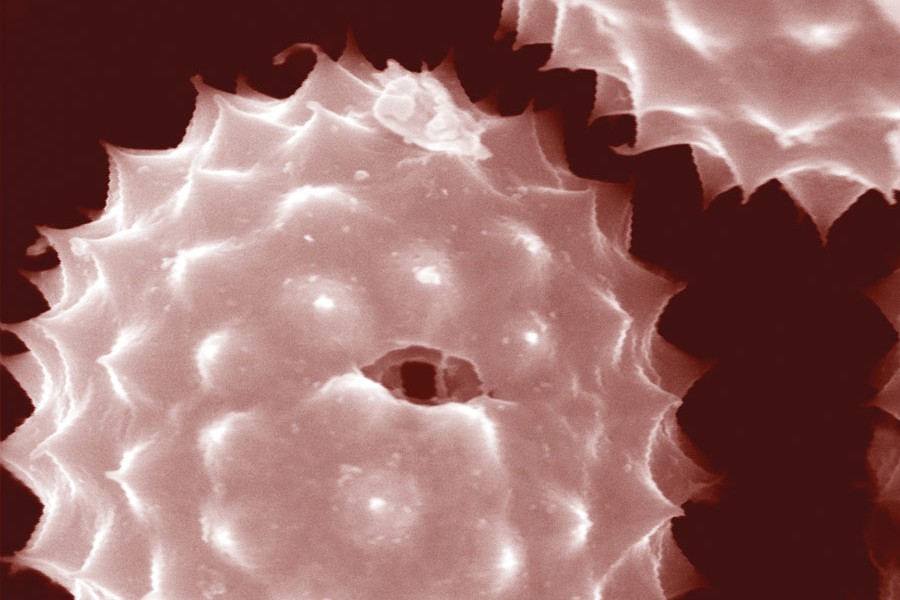Biomedical engineers have developed microscopic machines, smaller than a speck of dust and powered by body heat, that could harvest cells in the body for biopsy. Called mu-grippers, the machines successfully grabbed clusters of colon and esophageal cells after they were placed in test animals by endoscopy. Mu-grippers have the potential to gather far more cells for biopsy from many more locations in the body than can be obtained by conventional tools such as forceps. Learn more
Hay fever sufferers, remember this protein: Ambrosia artemisiifolia, major allergen 1. It's the primary ingredient in a once-a-day pill that researchers say effectively blocks many of the effects of ragweed allergy. A clinical trial found that volunteers who used the pill for a one-year period reported a 27 percent reduction in both overall symptoms and the need for other medications. Learn more
Elsewhere at Hopkins …
TOO MUCH
Researchers described the overdiagnosis and overtreatment of clinical depression in the United States as "staggering." A recent public health study used structured interviews to assess 5,639 adults who had been diagnosed with depression by medical professionals during a 12-month period. Despite the diagnoses, the study revealed that only 38.4 percent of the subjects met the criteria for having experienced major depressive episodes. Learn more
Healthy people who take vitamin D supplements should note new research that shows blood levels of the vitamin in excess of what is currently recommended provide no discernible benefit. Vitamin D has become a popular supplement because people believe it helps prevent a number of illnesses—including hypertension, atherosclerosis, and diabetes—and that they no longer get enough from sunlight because of concerns about sun exposure and skin cancer. Learn more
MRI images revealed that the brains of people who suffer from restless leg syndrome have abnormally high levels of glutamate, a neurotransmitter. Too much glutamate also interferes with sleep, which could explain why so many people with twitchy legs also report disrupted sleep, even after treatment alleviates the nocturnal muscle activity that gives RLS its name. The condition afflicts an estimated 5 percent of the U.S. population. Learn more
NOT ENOUGH
A study of 39 primary care physicians and 208 patients found that the doctors were much less likely to establish important emotional rapport with patients who were overweight or obese. The physicians were significantly more likely to express empathy, concern, or understanding when working with patients of normal weight. Bonding and empathy play important roles in persuading patients to improve their health by losing excess pounds. Learn more
MAPPING THE WAY
Engineers developed portable technology that can be used to make annotated maps of locations that cannot be surveyed by GPS systems, such as underground chambers or the inside of ships or buildings. Operators walk about carrying the 4-pound Enhanced Mapping and Positioning System in a backpack. EMAPS uses a laser scanner plus light, detection, and range sensors to create "floor plan" maps and detect potential threats such as radiation or hazardous chemicals. Learn more
Neuroscientists discovered that the hippocampus in rats' brains uses stored spatial information to imagine pathways that the rats might use to navigate familiar territory. The scientists likened their discovery to an internal GPS system and said it is the first evidence that rats plan routes in their minds before going to a remembered place. Learn more
IN ERROR
The standard formula for estimating low-density lipoprotein cholesterol—and gauging whether high-risk patients have LDL readings in the safe range—frequently produces inaccurate results. Called the Friedewald equation, the formula estimates LDL levels by subtracting HDL cholesterol and triglycerides from total cholesterol and dividing by five. When researchers compared figures produced by the equation to direct measurement of LDL in 1.3 million American adults, they found the Friedewald estimate was off nearly 25 percent of the time. Learn more
Assertions that catastrophic malpractice lawsuit payouts play a major role in escalating U.S. health care costs are wrong, according to a new review of malpractice settlements and judgments from 2004 to 2010. Researchers found that payouts of $1 million or more represent less than 1 percent of U.S. national medical expenditures. Learn more
Posted in Science+Technology








